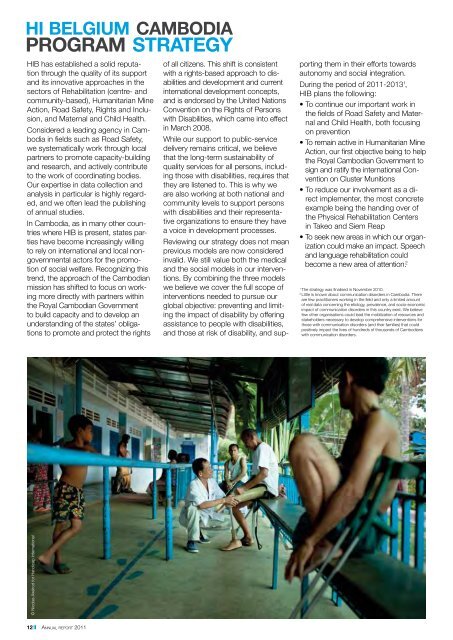Download the annual report 2011 of Cambodia and Thailand
Download the annual report 2011 of Cambodia and Thailand
Download the annual report 2011 of Cambodia and Thailand
You also want an ePaper? Increase the reach of your titles
YUMPU automatically turns print PDFs into web optimized ePapers that Google loves.
HIB has established a solid reputationthrough <strong>the</strong> quality <strong>of</strong> its support<strong>and</strong> its innovative approaches in <strong>the</strong>sectors <strong>of</strong> Rehabilitation (centre- <strong>and</strong>community-based), Humanitarian MineAction, Road Safety, Rights <strong>and</strong> Inclusion,<strong>and</strong> Maternal <strong>and</strong> Child Health.Considered a leading agency in <strong>Cambodia</strong>in fields such as Road Safety,we systematically work through localpartners to promote capacity-building<strong>and</strong> research, <strong>and</strong> actively contributeto <strong>the</strong> work <strong>of</strong> coordinating bodies.Our expertise in data collection <strong>and</strong>analysis in particular is highly regarded,<strong>and</strong> we <strong>of</strong>ten lead <strong>the</strong> publishing<strong>of</strong> <strong>annual</strong> studies.In <strong>Cambodia</strong>, as in many o<strong>the</strong>r countrieswhere HIB is present, states partieshave become increasingly willingto rely on international <strong>and</strong> local nongovernmentalactors for <strong>the</strong> promotion<strong>of</strong> social welfare. Recognizing thistrend, <strong>the</strong> approach <strong>of</strong> <strong>the</strong> <strong>Cambodia</strong>nmission has shifted to focus on workingmore directly with partners within<strong>the</strong> Royal <strong>Cambodia</strong>n Governmentto build capacity <strong>and</strong> to develop anunderst<strong>and</strong>ing <strong>of</strong> <strong>the</strong> states’ obligationsto promote <strong>and</strong> protect <strong>the</strong> rights<strong>of</strong> all citizens. This shift is consistentwith a rights-based approach to disabilities<strong>and</strong> development <strong>and</strong> currentinternational development concepts,<strong>and</strong> is endorsed by <strong>the</strong> United NationsConvention on <strong>the</strong> Rights <strong>of</strong> Personswith Disabilities, which came into effectin March 2008.While our support to public-servicedelivery remains critical, we believethat <strong>the</strong> long-term sustainability <strong>of</strong>quality services for all persons, includingthose with disabilities, requires that<strong>the</strong>y are listened to. This is why weare also working at both national <strong>and</strong>community levels to support personswith disabilities <strong>and</strong> <strong>the</strong>ir representativeorganizations to ensure <strong>the</strong>y havea voice in development processes.Reviewing our strategy does not meanprevious models are now consideredinvalid. We still value both <strong>the</strong> medical<strong>and</strong> <strong>the</strong> social models in our interventions.By combining <strong>the</strong> three modelswe believe we cover <strong>the</strong> full scope <strong>of</strong>interventions needed to pursue ourglobal objective: preventing <strong>and</strong> limiting<strong>the</strong> impact <strong>of</strong> disability by <strong>of</strong>feringassistance to people with disabilities,<strong>and</strong> those at risk <strong>of</strong> disability, <strong>and</strong> supporting<strong>the</strong>m in <strong>the</strong>ir efforts towardsautonomy <strong>and</strong> social integration.During <strong>the</strong> period <strong>of</strong> <strong>2011</strong>-2013 1 ,HIB plans <strong>the</strong> following:• To continue our important work in<strong>the</strong> fields <strong>of</strong> Road Safety <strong>and</strong> Maternal<strong>and</strong> Child Health, both focusingon prevention• To remain active in Humanitarian MineAction, our first objective being to help<strong>the</strong> Royal <strong>Cambodia</strong>n Government tosign <strong>and</strong> ratify <strong>the</strong> international Conventionon Cluster Munitions• To reduce our involvement as a directimplementer, <strong>the</strong> most concreteexample being <strong>the</strong> h<strong>and</strong>ing over <strong>of</strong><strong>the</strong> Physical Rehabilitation Centersin Takeo <strong>and</strong> Siem Reap• To seek new areas in which our organizationcould make an impact. Speech<strong>and</strong> language rehabilitation couldbecome a new area <strong>of</strong> attention. 21 The strategy was finalised in November 2010.2 Little is known about communication disorders in <strong>Cambodia</strong>. Thereare few practitioners working in <strong>the</strong> field <strong>and</strong> only a limited amount<strong>of</strong> real data concerning <strong>the</strong> etiology, prevalence, <strong>and</strong> socio-economicimpact <strong>of</strong> communication disorders in this country exist. We believefew o<strong>the</strong>r organisations could lead <strong>the</strong> mobilization <strong>of</strong> resources <strong>and</strong>stakeholders necessary to develop comprehensive interventions forthose with communication disorders (<strong>and</strong> <strong>the</strong>ir families) that couldpositively impact <strong>the</strong> lives <strong>of</strong> hundreds <strong>of</strong> thous<strong>and</strong>s <strong>of</strong> <strong>Cambodia</strong>nswith communication disorders.© Nicolas Axelrod for H<strong>and</strong>icap International12 Annual <strong>report</strong> <strong>2011</strong>

















